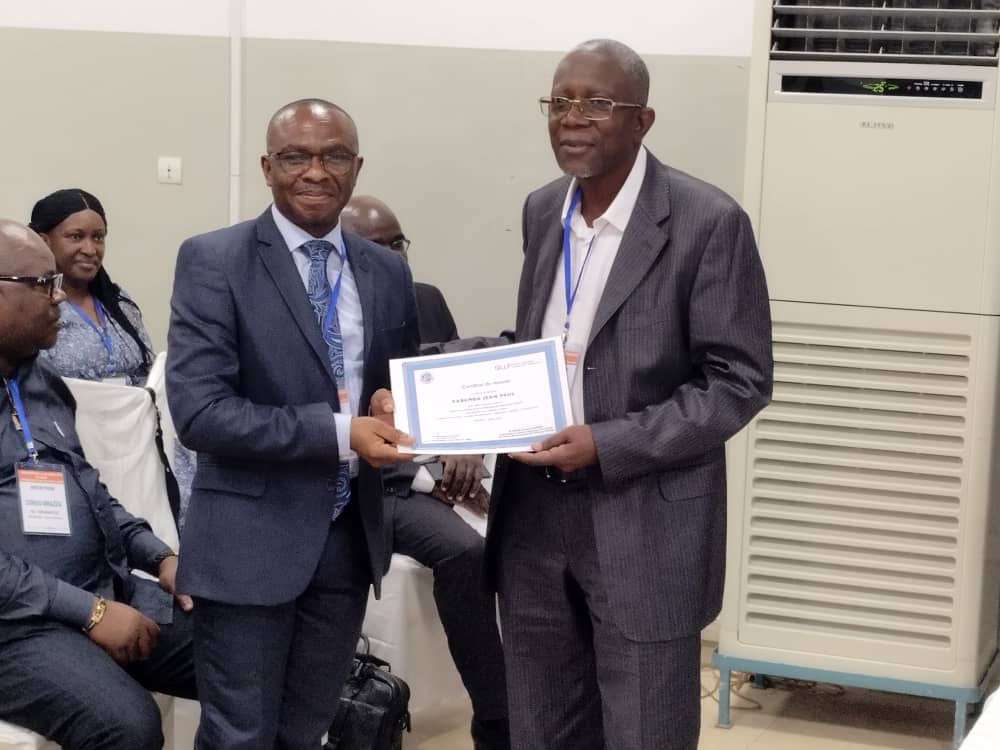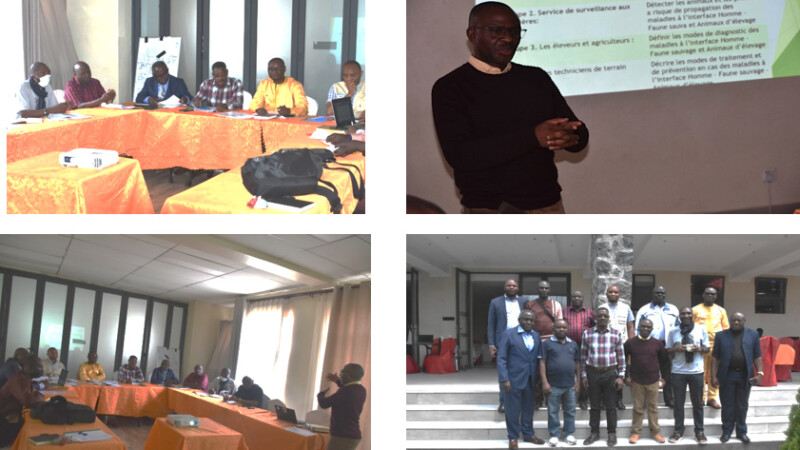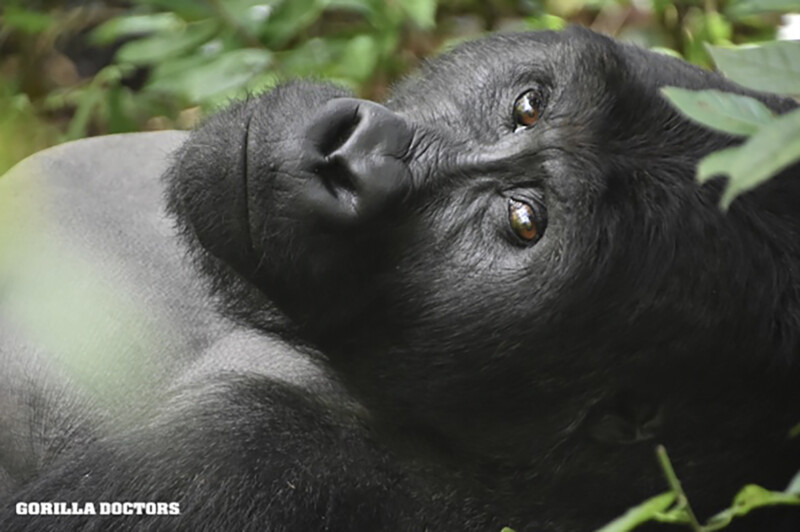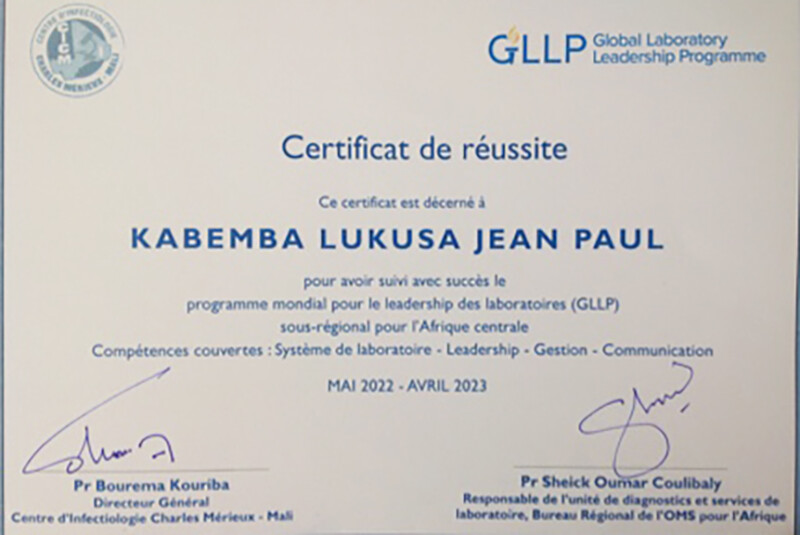Team DR Congo: Jean-Paul Kabemba Lukusa Completes Lab Leadership Training
By Gorilla Doctors Staff on Tuesday, April 4th, 2023 in Blog.1) JP, you serve as Gorilla Doctors’ Employee Health Program Manager. Can you tell us about your role and why human health is also important to gorilla health?
My role is to coordinate the activities of the employee health program in DR Congo, which has the overall objective of reducing the risk of disease spread between humans working directly or indirectly with gorillas. Human health is also important for the survival of gorillas, because gorillas and humans are genetically close – 98% of gorilla genes are similar to humans so both can be susceptible to the same diseases.
Specifically my role includes:
- Carry out complete health examinations of park staff (rangers and trackers),
- Detect and diagnose zoonotic pathogens (pathogens that move from animals to humans) and assess the risk of transmission between humans and gorillas;
- Sensitize park staff, and their family members on basic health and hygiene practies as well as family planning;
- Provide anti-parasitic treatment to park staff and family members four times a year.
2) You recently earned a certificate in Global Laboratory Leadership after completing a 10-month long training program – congratulations! Please tell us about this program – 1) what are some of the most important things you learned, and 2) how will this training and expertise help advance Gorilla Doctors’ mission?

Professor Missamou Mbbouiti Marcel (right) from Congo Brazaville presenting JP (left) with certificate of success. © Gorilla Doctors
Laboratories play an essential role in the detection, prevention and control of disease; laboratory capacity is identified as a basic indicator of the implementation of international health regulations (IHR, 2005). The successful functioning of this essential component requires that leaders in the laboratory field, including laboratory directors and senior managers of laboratories around the world, have leadership and managerial skills.
The World Health Organization (WHO) is engaged in the development of the Global Laboratory Leadership Program (GLLP) with the Food and Agriculture Organization of the United Nations (FAO), the World Oraganization for Animal Health (WOHA formally OIE), the European Center for Disease Prevention and Control (ECDC), the United States Centers for Disease Control and Prevention (CDC), and the United States Association of Public Health Laboratories (APHL). The goal of the GLLP is to equip laboratory leaders, present and future, with the leadership skills to build, strengthen and lead national laboratory systems.
In the WHO African region, French-speaking African countries (particularly Central Africa) have the weakest national health laboratory systems. WHO/AFRO organized a sub-regional training program in French, in collaboration with its partners FAO and OIE in Bamako, Mali for 10 months with the participation of five countries in the region: the Democratic Republic of Congo, Congo Brazzaville, Chad, the Central African Republic, and Gabon. Each country selected five participants. I was selected among the 5 participants from DR Congo because of my experience in the laboratory using the One Health approach.
During this training we learned the laboratory system in the One Health approach which takes a holistic approach by including: the human sector, animal sector, agricultural sector (plant) and the environmental sector. The training also provided us with capacities on the leadership and management of laboratories in the One Health approach for the detection, diagnosis, and surveillance of emerging and re-emerging diseases. Finally, the training also focused on scientific communication training – a very important part of the work. I personally, found this very interesting especially the oral communication and written communication aspects.
The expertise of this training will allow me to raise the quality of the activities of the employee health program and Gorilla Doctors’ laboratory diagnostics. This also allows us to expand the mission of Gorilla Doctors collaborative efforts through the establishment of a One Health Collaborative Framework for Disease Surveillance at the Human-Animal-Environment Interface.
3) As part of the GLLP program you organized and facilitated a regional workshop on the One Health approach. Who were the key stakeholders in attendance and what were your goals for the workshop?
As part of the GLLP program each participant carried out a personal project. My personal project was entitled as follows:
Establishment of a One Health Collaboration Framework for the Surveillance of Diseases at the Interface: Humans – Animals and the Environment.
The stakeholders are:
- Goma Veterinary Laboratory (LVG)
- National Institute for Biomedical Research (INRB)
- Congolese Institutes for Nature Conservation (ICCN)
- Animal Quarantine Service (SQAH)
- National Coordination of Fisheries and Aquaculture (CNADPA)
- Provincial One Health Committee of Goma (CPOH/Goma)
- Provincial Agriculture Inspectorate (IPA), Gorilla Doctors (GD)
- Cooperative Associations of Breeders’ Groups in North Kivu (Acogenoki)
- Provincial Division of Environment (DPE)
- Provincial Division of Health (DPS)
- Provincial Inspectorate of Fisheries and Livestock (IPPEL)
The overall objective of the workshop was to establish a collaborative One Health framework for disease surveillance at the Human-Animal-Environment interface. Specifically, to 1) identify the stakeholders of the collaboration framework, 2) identify the activities to be shared for the implementation of the collaboration framework, 3) sign a collaboration protocol between stakeholders and 4) establish a monthly meeting calendar.

JP facilitates the workshop he organized as his personal project for the program: Establishment of a One Health Collaboration Framework for the Surveillance of Diseases at the Interface: Humans-Animals and the Environment. © Gorilla Doctors
4) Last question, what is the most important message you want people to understand about our impact on the health of ourselves, animals, and the environment we all share?
The mission of Gorilla Doctors is to conserve wild mountain and eastern lowland (or Grauer’s) gorillas through life-saving veterinary medicine and through the One Health approach. The One Health approach aims to promote and establish dialogue and close collaboration between different sectors involved in disease control at the human, animal, plant, and environment interface. The implementation of the One Health Collaboration Framework will promote the visibility of the Gorilla Doctors mission, and will also raise the awareness of stakeholders to move from theory into practice of the One Health approach.
We send this message to the Gorilla Doctors community worldwide to support this One Health Collaborative Framework for disease surveillance at the Human-Animal-Environment interface for the protection and survival of Gorillas.

Nabanga, a silverback Grauer’s gorilla, Kahuzi-Biega National Park, DR Congo. March 30, 2023. © Gorilla Doctors
En français –
Team DR Congo : Jean-Paul Kabemba Lukusa termine une formation en leadership de laboratoire
1) Vous occupez le poste de responsable du programme de santé des employés de Gorilla Doctors. Pouvez-vous nous parler de votre rôle et pourquoi la santé humaine est également importante pour la santé des gorilles ?
Mon rôle est de coordonner les activités du programme de santé des employés, qui a pour objectif global de : réduire le risque de propagation des maladies entre les humains qui travaillent le contact direct ou indirect avec les gorilles.
Spécifiquement :
- Réaliser les examens sanitaires complet des éco – gardes,
- Détecter et diagnostiquer les pathogènes zoonotiques et le risque de transmission entre les humains et les gorilles;
- Sensibiliser les éco – gardes, leurs épouses et les membres de leur famille sur les règles d’hygiène en général, les maladies sexuellement transmissibles et la planification familiale ;
- Déparasiter les éco – gardes, leurs épouses et les membres de leur famille avec l’anti helminthe quatre fois l’an.
La santé humaine est aussi importante pour la survie des gorilles, parce que les gorilles et les humains sont proches génétiquement soit 98 % des gènes des gorilles sont semblable à ceux des humains et les deux peuvent développer les mêmes maladies.
2) Vous avez récemment obtenu un certificat en Global Laboratory Leadership après avoir suivi un programme de formation de 10 mois – félicitations ! Veuillez nous parler de ce programme – 1) quelles sont certaines des choses les plus importantes que vous avez apprises, et 2) comment cette formation et cette expertise aideront-elles à faire avancer la mission de Gorilla Doctors?
Les laboratoires jouent un rôle essentiel dans la détection, la prévention et le contrôle des maladies ; la capacité du laboratoire est identifiée comme un indicateur de base de la mise en œuvre du règlement sanitaire international (RSI, 2005). Le bon fonctionnement de cette composante essentielle exige que les leaders du domaine de laboratoire, y compris les directeurs de laboratoire et cadre supérieur des laboratoires du monde entier, aient des compétences en leadership et en gestion/management.
L’organisation mondiale de la santé (OMS) est engagée dans l’élaboration du programme mondial pour le leadership des laboratoires (GLLP) avec l’organisation des nations unies pour l’alimentation et l’agriculture (FAO), l’organisation mondiale de la santé animale (OIE), le centre européen de prévention et de contrôle des maladies (ECDC), les centers for disease control and prévention des États – unis (CDC), et l’association of Public Health Laboratories des états unis (APHL)
L’objectif du GLLP est de doter les leaders de laboratoire, présents et futurs, en compétences de leadership pour construire, renforcer et piloter les systèmes nationaux de laboratoire.
Dans la région africaine de l’OMS, les Pays d’Afrique francophone (en particulier l’Afrique centrale) présentent les systèmes nationaux de laboratoire de santé les plus faibles.
L’OMS/AFRO a organisée un programme de formation sous – régional en langue française, en collaboration avec ses partenaires FAO et OIE à Bamako au Mali pendant 10 mois avec la participation de cinq pays de la région à savoir : la République démocratique du Congo, Le Congo Brazzaville, Le Tchad, la République centre africaine et le Gabon, en raison de cinq participants par pays. j’étais aussi sélectionné parmi les 5 participants de la RDC à cause de mon expérience au laboratoire à travers l’approche une seule santé.
Durant cette formation, nous avons appris le système de laboratoire dans l’approche une seule santé qui est multifactorielle : secteur humain, secteur animal, secteur agricole (végétal) et le secteur environnemental. La formation nous a aussi doté des capacités sur le leadership et la gestion des laboratoires dans l’approche une seule santé pour la détection, le diagnostic et surveillance des maladies émergentes et re émergentes. Enfin la communication scientifique la partie très importante que personnellement, j’ai trouvé très intéressante dans ces deux aspects :
Communication Orale et communication écrite.
L’expertise de cette formation me permettra de relever la qualité des activités du programme de santé des employés et du laboratoire Gorilla Doctors, ainsi que d’élargir la mission de Gorilla Doctors à travers les différentes parties prenantes après la mise en place d’un cadre de collaboration une seul santé pour la surveillance des maladies à l’interface Homme – Animaux et Environnement.
3) Dans le cadre du programme, vous avez organisé et animé un atelier régional sur l’approche One Health. Qui étaient les principales parties prenantes présentes et quels étaient vos objectifs pour l’atelier?
Dans le cadre du programme GLLP ; chaque participant devrait réaliser un projet personnel, en ce qui me concerne mon projet personnel était intitulée comme suit : mise en place d’un cadre de collaboration une seule santé pour la surveillance des maladies à l’interface : homme – Animaux et Environnement.
Les parties prenantes sont:
- le Laboratoire Vétérinaire de Goma (LVG)
- L’Institut National de Recherches Biomédicales (INRB)
- l’Instituts Congolais pour la Conservation de la Nature (ICCN)
- le service de Quarantaine Animal (SQAH)
- Coordination Nationale de Pêche et Aquaculture (CNADPA)
- le Comite Provincial One Health de Goma (CPOH/Goma)
- l’Inspection provincial agriculture (IPA), Gorilla Doctors (GD)
- l’Associations Coopérative des groupements d’éleveurs du Nord – Kivu (Acogenoki)
- la Division Provinciale d’Environnement (DPE)
- la Division Provinciale de la santé (DPS)
- l’Inspection Provinciale pêche et élevage (IPPEL)
L’atelier avait pour objectif global de mettre en place un cadre de collaboration une seule santé pour la surveillance des maladies à l’interface Homme – animaux et Environnement.
Spécifiquement; identifier les parties prenantes du cadre de collaboration, identifier les activités à mettre en commun, pour la mise en œuvre du cadre de collaboration ; signer un protocole de collaboration entre parties prenantes, fixer les jours de rencontre mensuelle par les parties prenantes.
4) Dernière question, quel est le message le plus important que vous voulez que les gens comprennent concernant notre impact sur notre santé, celle des animaux et de l’environnement que nous partageons tous?
La mission de Gorilla Doctors est de conserver les gorilles sauvages des montagnes et des plaines orientales (ou de Grauer) grâce à la médecine vétérinaire qui sauve des vies et à travers l’ approche une seule santé qui vise à promouvoir et à établir un dialogue et une étroite collaboration entre différents secteurs impliqués dans le contrôle de la maladie a l’interface homme, animal, plante et environnement. La mise en œuvre de ce cadre de collaboration une seule santé pour la surveillance des maladies à l’interface Homme – Animaux et Environnement vont favoriser la visibilité des activités de la mission de Gorilla Doctors, réveilleront aussi la conscience des parties prenantes à mieux pratiquer l’approche une seule santé ; « de la théorie à la pratique une seule santé.
Nous lançons ce message à la communauté Gorilla Doctors du monde entier de soutenir ce cadre de collaboration une seule santé pour la surveillance des maladies à l’interface : homme – Animaux et Environnement pour la protection et la survie des Gorilles.


 Donate
Donate
